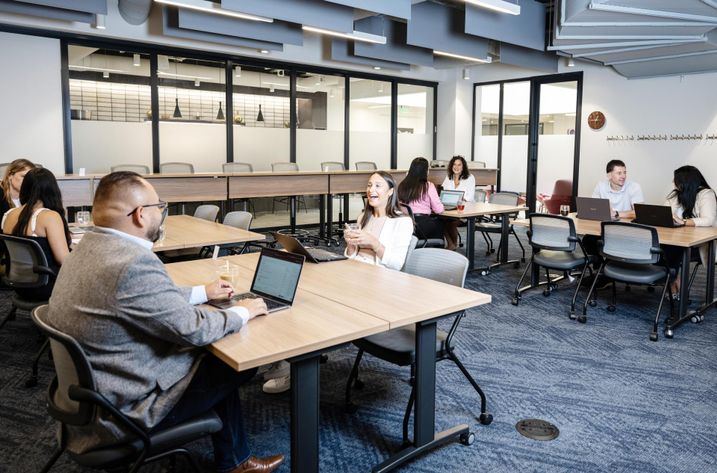The Game Has Changed: 15% Of All Office Space Inquiries Are For Flexible Office Now
For as long as there have been office leases, tenant rep brokers have earned the highest commissions when their clients have been burdened with the least flexibility — by committing to the most space for the longest term.
That conflict is fading away as tenant demand shifts to address hybrid work styles and tenants seek new ways of consuming real estate services, said Simon Moore, chief operating officer of Serendipity Labs, an international workplace operator that provides an upscale network of outsourced workplace services in urban and suburban markets across the U.S. and UK.
Moore said office leasing representatives are aligning with tenants’ interests and winning more business by recommending that clients optimize their space requirements.
These brokers are emphasizing shorter terms with smaller layouts that are designed to support collaboration and connection. This includes placing tenants in flexible office space and adopting coworking options that augment or replace conventional office leasing strategies.
It is no surprise that hybrid work is driving reductions in space requirements and leading to more flexible terms. It has become the dominant style of work worldwide, with 90% of companies reporting some form of hybrid work policy, according to JLL.
Even as it is predicted that 38% of companies with hybrid work policies will implement more return-to-office days by the end of the year, it is clear that hybrid work is here to stay, with only 19% of companies reporting their employees are in the office full time.
Flexibility will continue to be a top priority as long as this form of work exists, Moore said.
According to Yardi Systems, coworking now accounts for 15% of all office space inquiries nationally, up from 6% just two years ago.
“A 50-person requirement used to mean leasing 10K SF of conventional office space for 10 years,” Moore said. “Today, with hybrid work, that’s right in the sweet spot for a flexible office solution.”
Tenants are on board with the shift to flexibility.
Companies that adopt a distributed workforce strategy find that a suite with 50 desks and access to on-demand meeting and event spaces can support 200 workers, Moore said. As a result, these companies are finding that they no longer need to manage and lease a regional office.
He said a survey of more than 500 corporate real estate professionals at the CoreNet Global Summit offered further evidence that hybrid work will reduce the traditional office space needs for many corporate real estate users.
A majority said they expected to trim their space needs by double digits, while two-thirds were looking to shift 10% to 40% of their leases to flexible arrangements.
“Our national corporate occupier clients are using flexible office providers for their regional office needs for up to 100 people to add agility and minimize upfront capital expenditures,” said Joshua Meltzer, senior managing director at Savills Real Estate in Los Angeles. “These arrangements are move-in-ready, compliant with their workplace standards and offer vibrancy as well as amenities that help attract their teams.”
As a result, the national coworking market is picking up steam, particularly in the suburbs.
The U.S. coworking stock grew by 7% from Q1 to Q2, with popular cities such as Nashville showing 24% quarter-over-quarter growth, according to an October report from CoworkingCafe.
In addition, the average lease size is now 27% smaller than prepandemic due to greater economic uncertainty and hybrid work policies, according to CBRE’s analysis of office leasing data from the first half of 2024. This makes the short-term lease and coworking model even more attractive.
Another driver for brokers to recommend flexible office options is that the standard 10% commission paid on flexible office deals is more than double the conventional lease commission rate in most markets, Moore said.
“Short, simple service contracts can be signed on the spot for flexible workplace options, compared with the time-consuming, costly legal negotiation cycles of a typical office lease,” he said.
Brokers and tenants are aligning on the move toward more agility and flexible office space options.
As a result, forecasts that a third of all office space will someday be leased via prebuilt, shorter conventional leases or coworking may soon come to fruition.
This article was produced in collaboration between Serendipity Labs and Studio B. Bisnow news staff was not involved in the production of this content.
Studio B is Bisnow’s in-house content and design studio. To learn more about how Studio B can help your team, reach out to studio@bisnow.com.


